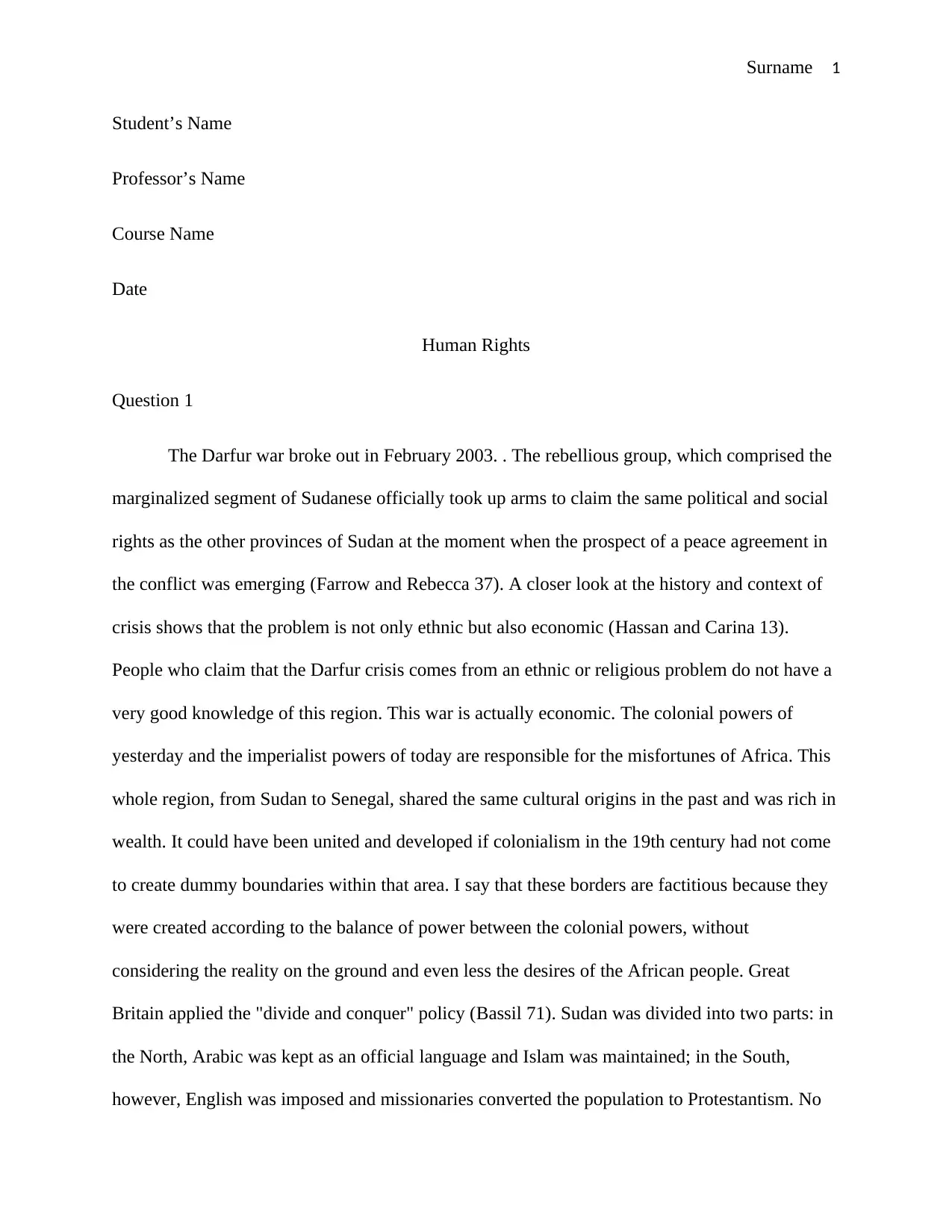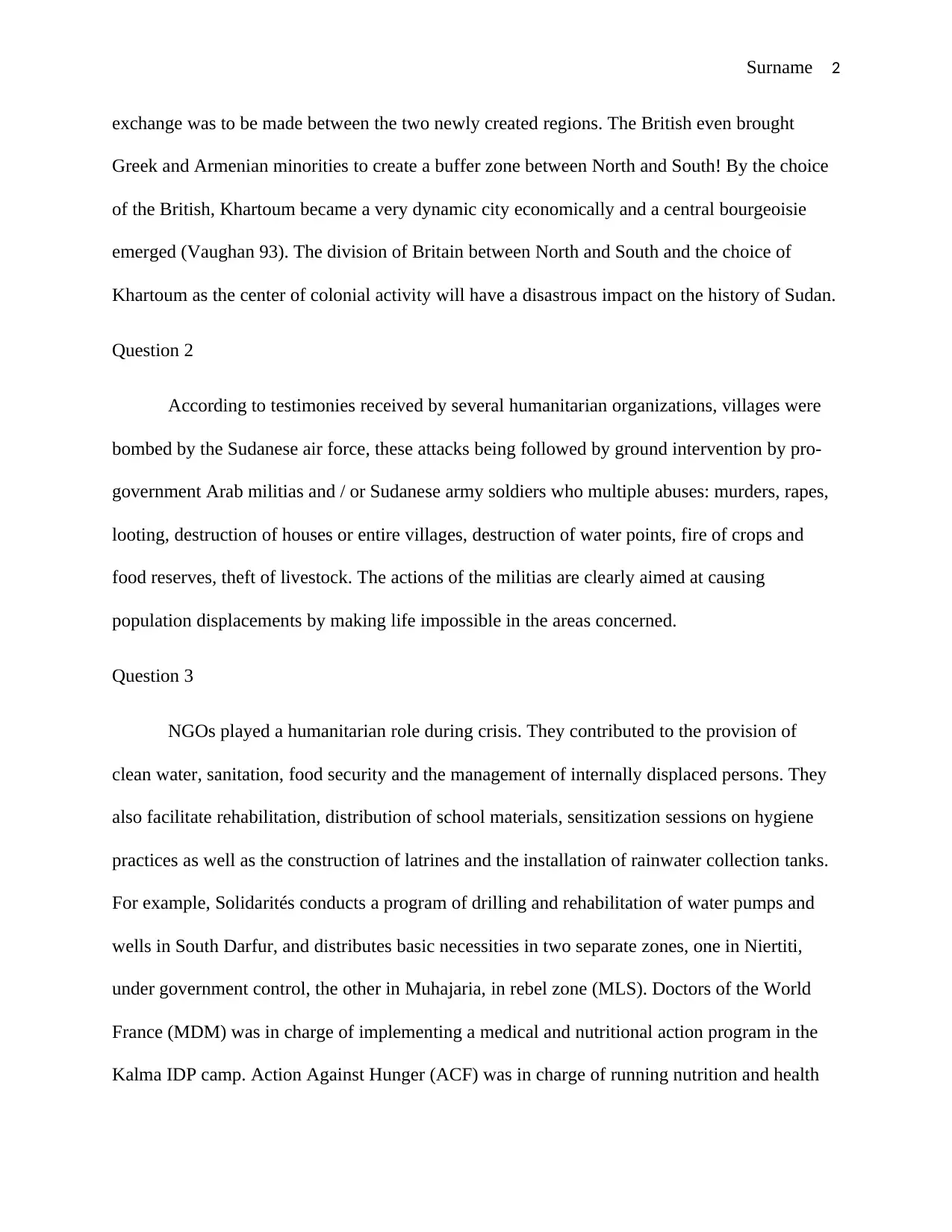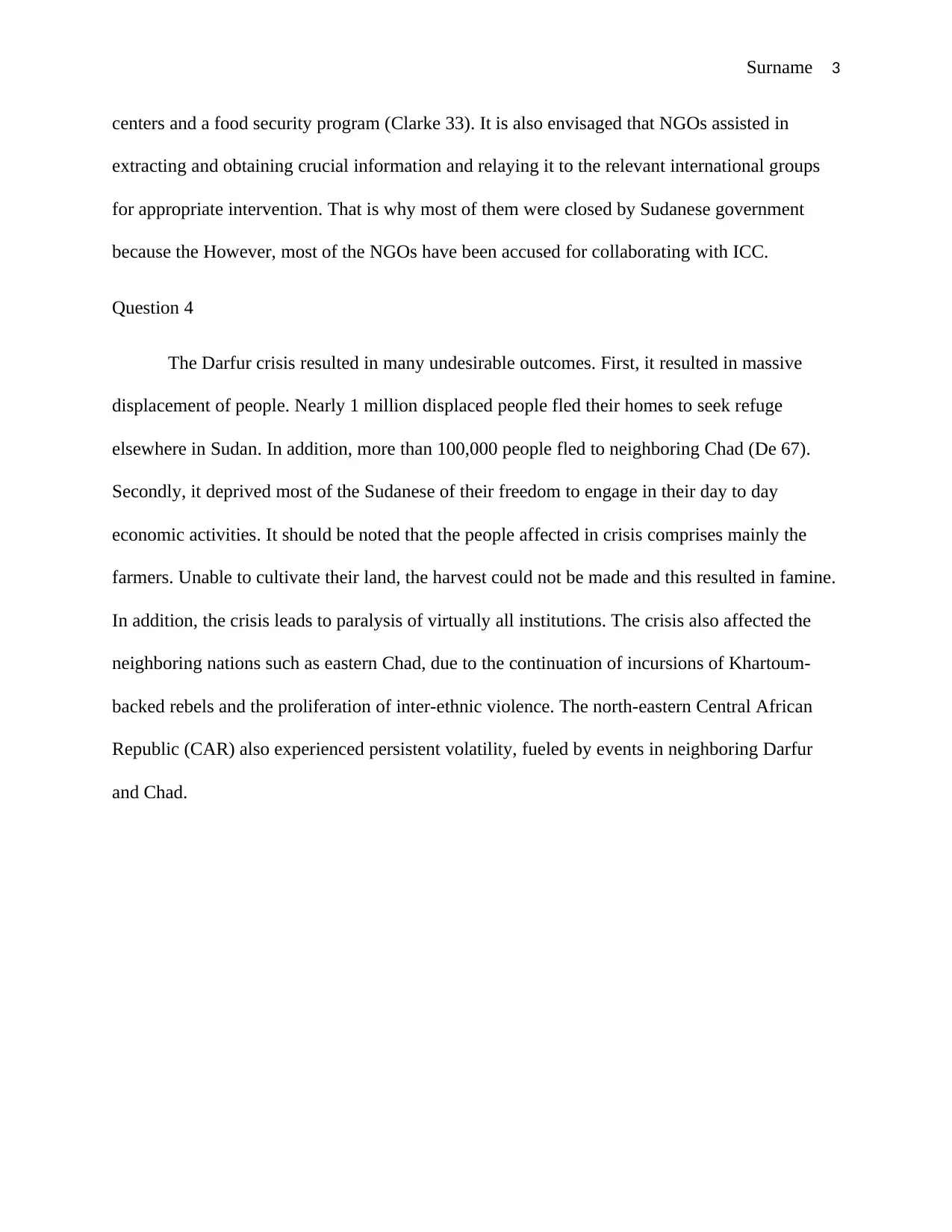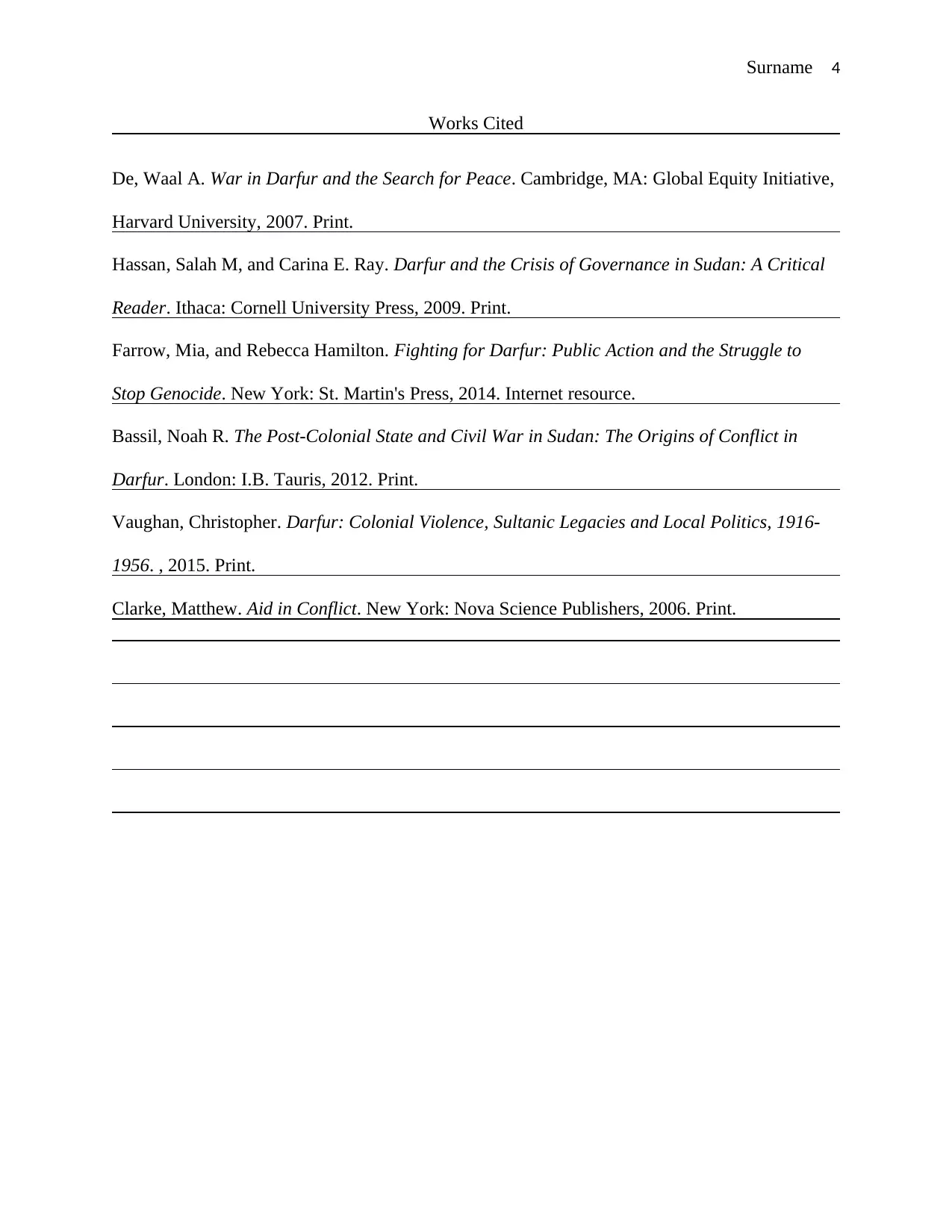Darfur Conflict: Human Rights, Humanitarian Aid, and Consequences
VerifiedAdded on 2023/06/07
|4
|1027
|77
Essay
AI Summary
This essay examines the Darfur conflict, which began in 2003, focusing on human rights violations, the roles of NGOs, and the crisis's consequences. It highlights the economic and political roots of the conflict, the humanitarian role of NGOs in providing essential services and information, and the devastating outcomes, including mass displacement, economic disruption, and regional instability. The essay also touches on the Sudanese government's actions against NGOs and the accusations of collaboration with the International Criminal Court (ICC). Desklib offers further resources and solved assignments for students studying similar topics.

Surname 1
Student’s Name
Professor’s Name
Course Name
Date
Human Rights
Question 1
The Darfur war broke out in February 2003. . The rebellious group, which comprised the
marginalized segment of Sudanese officially took up arms to claim the same political and social
rights as the other provinces of Sudan at the moment when the prospect of a peace agreement in
the conflict was emerging (Farrow and Rebecca 37). A closer look at the history and context of
crisis shows that the problem is not only ethnic but also economic (Hassan and Carina 13).
People who claim that the Darfur crisis comes from an ethnic or religious problem do not have a
very good knowledge of this region. This war is actually economic. The colonial powers of
yesterday and the imperialist powers of today are responsible for the misfortunes of Africa. This
whole region, from Sudan to Senegal, shared the same cultural origins in the past and was rich in
wealth. It could have been united and developed if colonialism in the 19th century had not come
to create dummy boundaries within that area. I say that these borders are factitious because they
were created according to the balance of power between the colonial powers, without
considering the reality on the ground and even less the desires of the African people. Great
Britain applied the "divide and conquer" policy (Bassil 71). Sudan was divided into two parts: in
the North, Arabic was kept as an official language and Islam was maintained; in the South,
however, English was imposed and missionaries converted the population to Protestantism. No
Student’s Name
Professor’s Name
Course Name
Date
Human Rights
Question 1
The Darfur war broke out in February 2003. . The rebellious group, which comprised the
marginalized segment of Sudanese officially took up arms to claim the same political and social
rights as the other provinces of Sudan at the moment when the prospect of a peace agreement in
the conflict was emerging (Farrow and Rebecca 37). A closer look at the history and context of
crisis shows that the problem is not only ethnic but also economic (Hassan and Carina 13).
People who claim that the Darfur crisis comes from an ethnic or religious problem do not have a
very good knowledge of this region. This war is actually economic. The colonial powers of
yesterday and the imperialist powers of today are responsible for the misfortunes of Africa. This
whole region, from Sudan to Senegal, shared the same cultural origins in the past and was rich in
wealth. It could have been united and developed if colonialism in the 19th century had not come
to create dummy boundaries within that area. I say that these borders are factitious because they
were created according to the balance of power between the colonial powers, without
considering the reality on the ground and even less the desires of the African people. Great
Britain applied the "divide and conquer" policy (Bassil 71). Sudan was divided into two parts: in
the North, Arabic was kept as an official language and Islam was maintained; in the South,
however, English was imposed and missionaries converted the population to Protestantism. No
Paraphrase This Document
Need a fresh take? Get an instant paraphrase of this document with our AI Paraphraser

Surname 2
exchange was to be made between the two newly created regions. The British even brought
Greek and Armenian minorities to create a buffer zone between North and South! By the choice
of the British, Khartoum became a very dynamic city economically and a central bourgeoisie
emerged (Vaughan 93). The division of Britain between North and South and the choice of
Khartoum as the center of colonial activity will have a disastrous impact on the history of Sudan.
Question 2
According to testimonies received by several humanitarian organizations, villages were
bombed by the Sudanese air force, these attacks being followed by ground intervention by pro-
government Arab militias and / or Sudanese army soldiers who multiple abuses: murders, rapes,
looting, destruction of houses or entire villages, destruction of water points, fire of crops and
food reserves, theft of livestock. The actions of the militias are clearly aimed at causing
population displacements by making life impossible in the areas concerned.
Question 3
NGOs played a humanitarian role during crisis. They contributed to the provision of
clean water, sanitation, food security and the management of internally displaced persons. They
also facilitate rehabilitation, distribution of school materials, sensitization sessions on hygiene
practices as well as the construction of latrines and the installation of rainwater collection tanks.
For example, Solidarités conducts a program of drilling and rehabilitation of water pumps and
wells in South Darfur, and distributes basic necessities in two separate zones, one in Niertiti,
under government control, the other in Muhajaria, in rebel zone (MLS). Doctors of the World
France (MDM) was in charge of implementing a medical and nutritional action program in the
Kalma IDP camp. Action Against Hunger (ACF) was in charge of running nutrition and health
exchange was to be made between the two newly created regions. The British even brought
Greek and Armenian minorities to create a buffer zone between North and South! By the choice
of the British, Khartoum became a very dynamic city economically and a central bourgeoisie
emerged (Vaughan 93). The division of Britain between North and South and the choice of
Khartoum as the center of colonial activity will have a disastrous impact on the history of Sudan.
Question 2
According to testimonies received by several humanitarian organizations, villages were
bombed by the Sudanese air force, these attacks being followed by ground intervention by pro-
government Arab militias and / or Sudanese army soldiers who multiple abuses: murders, rapes,
looting, destruction of houses or entire villages, destruction of water points, fire of crops and
food reserves, theft of livestock. The actions of the militias are clearly aimed at causing
population displacements by making life impossible in the areas concerned.
Question 3
NGOs played a humanitarian role during crisis. They contributed to the provision of
clean water, sanitation, food security and the management of internally displaced persons. They
also facilitate rehabilitation, distribution of school materials, sensitization sessions on hygiene
practices as well as the construction of latrines and the installation of rainwater collection tanks.
For example, Solidarités conducts a program of drilling and rehabilitation of water pumps and
wells in South Darfur, and distributes basic necessities in two separate zones, one in Niertiti,
under government control, the other in Muhajaria, in rebel zone (MLS). Doctors of the World
France (MDM) was in charge of implementing a medical and nutritional action program in the
Kalma IDP camp. Action Against Hunger (ACF) was in charge of running nutrition and health

Surname 3
centers and a food security program (Clarke 33). It is also envisaged that NGOs assisted in
extracting and obtaining crucial information and relaying it to the relevant international groups
for appropriate intervention. That is why most of them were closed by Sudanese government
because the However, most of the NGOs have been accused for collaborating with ICC.
Question 4
The Darfur crisis resulted in many undesirable outcomes. First, it resulted in massive
displacement of people. Nearly 1 million displaced people fled their homes to seek refuge
elsewhere in Sudan. In addition, more than 100,000 people fled to neighboring Chad (De 67).
Secondly, it deprived most of the Sudanese of their freedom to engage in their day to day
economic activities. It should be noted that the people affected in crisis comprises mainly the
farmers. Unable to cultivate their land, the harvest could not be made and this resulted in famine.
In addition, the crisis leads to paralysis of virtually all institutions. The crisis also affected the
neighboring nations such as eastern Chad, due to the continuation of incursions of Khartoum-
backed rebels and the proliferation of inter-ethnic violence. The north-eastern Central African
Republic (CAR) also experienced persistent volatility, fueled by events in neighboring Darfur
and Chad.
centers and a food security program (Clarke 33). It is also envisaged that NGOs assisted in
extracting and obtaining crucial information and relaying it to the relevant international groups
for appropriate intervention. That is why most of them were closed by Sudanese government
because the However, most of the NGOs have been accused for collaborating with ICC.
Question 4
The Darfur crisis resulted in many undesirable outcomes. First, it resulted in massive
displacement of people. Nearly 1 million displaced people fled their homes to seek refuge
elsewhere in Sudan. In addition, more than 100,000 people fled to neighboring Chad (De 67).
Secondly, it deprived most of the Sudanese of their freedom to engage in their day to day
economic activities. It should be noted that the people affected in crisis comprises mainly the
farmers. Unable to cultivate their land, the harvest could not be made and this resulted in famine.
In addition, the crisis leads to paralysis of virtually all institutions. The crisis also affected the
neighboring nations such as eastern Chad, due to the continuation of incursions of Khartoum-
backed rebels and the proliferation of inter-ethnic violence. The north-eastern Central African
Republic (CAR) also experienced persistent volatility, fueled by events in neighboring Darfur
and Chad.
⊘ This is a preview!⊘
Do you want full access?
Subscribe today to unlock all pages.

Trusted by 1+ million students worldwide

Surname 4
Works Cited
De, Waal A. War in Darfur and the Search for Peace. Cambridge, MA: Global Equity Initiative,
Harvard University, 2007. Print.
Hassan, Salah M, and Carina E. Ray. Darfur and the Crisis of Governance in Sudan: A Critical
Reader. Ithaca: Cornell University Press, 2009. Print.
Farrow, Mia, and Rebecca Hamilton. Fighting for Darfur: Public Action and the Struggle to
Stop Genocide. New York: St. Martin's Press, 2014. Internet resource.
Bassil, Noah R. The Post-Colonial State and Civil War in Sudan: The Origins of Conflict in
Darfur. London: I.B. Tauris, 2012. Print.
Vaughan, Christopher. Darfur: Colonial Violence, Sultanic Legacies and Local Politics, 1916-
1956. , 2015. Print.
Clarke, Matthew. Aid in Conflict. New York: Nova Science Publishers, 2006. Print.
Works Cited
De, Waal A. War in Darfur and the Search for Peace. Cambridge, MA: Global Equity Initiative,
Harvard University, 2007. Print.
Hassan, Salah M, and Carina E. Ray. Darfur and the Crisis of Governance in Sudan: A Critical
Reader. Ithaca: Cornell University Press, 2009. Print.
Farrow, Mia, and Rebecca Hamilton. Fighting for Darfur: Public Action and the Struggle to
Stop Genocide. New York: St. Martin's Press, 2014. Internet resource.
Bassil, Noah R. The Post-Colonial State and Civil War in Sudan: The Origins of Conflict in
Darfur. London: I.B. Tauris, 2012. Print.
Vaughan, Christopher. Darfur: Colonial Violence, Sultanic Legacies and Local Politics, 1916-
1956. , 2015. Print.
Clarke, Matthew. Aid in Conflict. New York: Nova Science Publishers, 2006. Print.
1 out of 4
Your All-in-One AI-Powered Toolkit for Academic Success.
+13062052269
info@desklib.com
Available 24*7 on WhatsApp / Email
![[object Object]](/_next/static/media/star-bottom.7253800d.svg)
Unlock your academic potential
Copyright © 2020–2026 A2Z Services. All Rights Reserved. Developed and managed by ZUCOL.

